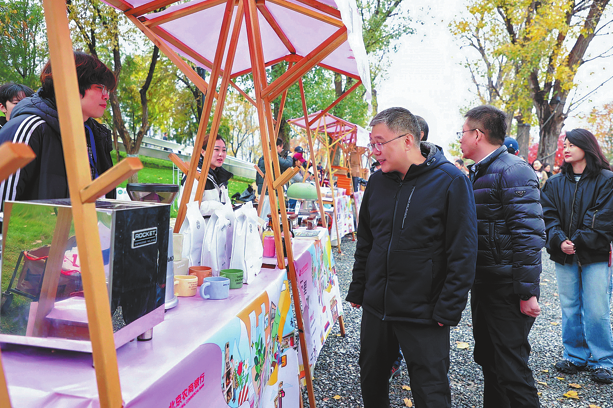Point of transition
Sudden departure of head of WTO may signal the body's demise and the fragmenting of the global trade system


On May 14, World Trade Organization Director-General Roberto Azevedo announced his decision to step down on Aug 31, shortening his second term by one year. The organization has witnessed six director-generals in the past 25 years since its inception in 1995, and this is the first early departure of its top official. The WTO is undergoing an unprecedented tough time and Azevedo's leaving might be an indicator of a transition in the global trading system.
The disastrous impact of the COVID-19 pandemic and the passive policies of the US administration are what have prompted Azevedo to make his decision.
First, the pandemic has been a heavy blow to global trade, and ends the recovery trend which started in 2017. The WTO forecast in April that global trade will shrink by 13 percent to 32 percent in 2020, a decline worse than that after the 2008 international financial crisis. Global trade will once again enter a low-speed period and repeat the "great trade collapse "of 2012-15 when the growth rate of trade remained lower than that of the world economy. As the centerpiece of the multilateral trading regime, the WTO has always upheld its founding purpose of boosting global trade and the world economy. But it has failed in the face of the current pandemic. More countries are turning inward, with strict export controls on medical resources and foods, closed borders, suspended flights and shipments and travel bans. The core function of the WTO is to break trade barriers, promote open trade reforms, and enhance coordinated trading policies through negotiations. However, the soaring trade protectionism has brought the organization's effectiveness into question.
Second, US trade policies have nearly paralyzed the WTO. The US administration has resorted to unilateralism and trade protectionism since 2017, taken a series of de-globalization measures including dropping out of several international organizations, and severely hurt the multilateral trading regime. The United States has blocked the appointment of judges to the WTO Appellate Body, effectively killing it. Azevedo tried on several occasions to communicate with the US government on the trade dispute mechanism, but without results. Azevedo has been powerless to coordinate between the US and other member states, unable to bridge the gaps and rescue the trade dispute solving mechanism from collapsing. This may have been the last straw for the director-general.
Whoever takes over the position in the future will face three pressing issues, and in a more precarious environment where the law of the jungle poses a huge threat to the stability and growth of trade.
First, how to promote global trade negotiations to establish new trade rules? This is the most important function of the WTO. Apart from the Bali Package of 2013 and ITA expansion in 2015, multilateral trade negotiations have delivered no real results for a long time. Negotiations on topics such as government procurement, trade in services and e-commerce have only made progress among some member states. To safeguard the central place of the WTO, such plurilateral negotiations should be expanded to multilateral ones to formulate new trade rules.
Second, how to expand consensus and inclusive, reciprocal and modern WTO reform? The ministerial conference last December started the WTO's reform agenda with the aim of revitalizing itself. Developed countries, led by the US, hope to dominate the reform process, and so enhance their leadership and make the organization more tailored to their interests. As a result, several proposals submitted to the secretariat identified investment, non-tariff trade barriers, intellectual property, environment, employment, competitive policies, State-owned enterprises and nonmarket policy orientations as priorities for reform. In fact, such plans ignore developing countries' need for more development-oriented and more inclusive reforms. Reciprocity is a cornerstone for the WTO, and is the central principal for a rule-based multilateral trading system. Too much emphasis on the interests of developed countries and ignoring those of developing ones was the root cause of the failure of the Doha round negotiations.
Third, how to coordinate policies of major countries and strike a balance between member states? The US unilateralism is the biggest threat to the WTO. Azevedo said although the US under the previous administration complained about the WTO many times, it is the current administration that is seriously undermining the international trade order with its use of domestic 232 and 301 clauses to wage trade wars against China, the European Union and other trading partners. Even many US scholars question the government's trade policies, noting that other trading partners will also adopt unilateralism, which in the long run will hurt the rules-based multilateral trading regime and eventually undermine US interests. Whoever takes the Azevedo's seat can't escape from the issue of balancing the calls of member states, preventing the organization from being controlled by powers, and winning the widest support of the 164 member states.
The WTO reform is urgent and the sudden departure of Azevedo may become a point of transition in global trade. With the failure of the trade governance system, global trade might return to the law of the jungle and become power-based. Global trade governance will become more fragmented. Regional and bilateral free trade agreements, in particular those mege-FTAs between giant economies, will become new negotiating platforms for trade rules. In this scenario, China should embrace the new changes in a more open and cooperative manner to promote win-win results. To reduce the impact of a weakening WTO, China should promote the Regional Comprehensive Economic Partnership, Comprehensive Progressive Trans-Pacific Partnership, China-Japan-the Republic of Korea and China Eurasia Economic Union trade agreements, and work with the European Union and Canada toward a temporary multilateral arrangement for appeals and arbitration, and join hands with partners for stronger cooperation consensus and expand room for China's foreign trade policy.
The author is an assistant researcher at the Institute of World Economics and Politics at the Chinese Academy of Social Sciences. The author contributed this article to China Watch, a think tank powered by China Daily. The views do not necessarily reflect those of China Daily.


































